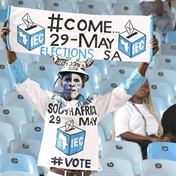When we make everything debatable, we favour the privileged and set up the oppressed to lose.
I have written before that part of the challenge with the level of discourse in this country about the consequences of various oppressive systems is trapped in a cycle of debate.
South Africa loves to “debate”. We talk about the “race debate”, where really we “debate” the existence of racism, and where those living through and experiencing racism spend the bulk of the “debate” explaining that racism exists.
We ask distracting questions and talk about race as if it can neatly exist outside of a system of white supremacy. We debate, and debate. We get “opposing”, often denialist, views and debate and go pretty much nowhere, because we are trapped debating things we should no longer be debating.
In 2015, it should no longer be a matter of debate that racism at a day-to-day and institutional level exists in South Africa. Black thinkers should no longer be getting invitations to speak and opine on this, and get trapped in the cycle of fruitless debates.
It distracts black thinkers from doing good and new work, because we never get to think and not be preoccupied with rebuttals.
We debate whether white privilege exists when there is research and evidence confirming that South African institutions and systems continue to benefit white people, largely as a legacy of apartheid, which intended to and successfully privileged whiteness.
We keep debating whether or not men, and in particular black men, enjoy male privilege as a result of institutionalised and systemic sexism, and take the time and labour of black women to explain this. And on and on it goes.
The debate trap was well articulated for me by Gavin Davis, DA MP and shadow minister of basic education, tweeting to writer and analyst Mzukisi Qobo, who said to Davis: “I hope to see your passionate champion for redress & promotion of other languages as much as you do for historically privileged one.” He was referring to Afrikaans.
In response, Davis tweeted: “Notion of Afrikaans as ‘privileged’ is a myth. But, of course, I support the promotion of all our languages. Don’t you?”
In one tweet, Davis dismisses a well-documented historical fact as “myth”, and while I don’t believe there was any malice on his part, it was the perfect summation of what I think our culture of debating everything has led to.
Qobo, with an understanding of South Africa’s history and the machinations of the National Party’s apartheid state, correctly calls Afrikaans a “historically privileged” language, which Davis dismisses as “myth”.
Our current discourse makes ample room for the subtle and often overt denialism displayed by Davis in this instance.
Statements like Davis’ are discursive quicksand and very quickly trap the conversation in a struggle around what is true and what is not, when there is documented evidence of the Nationalists’ bid to cede from the British empire and (ironically as they were colonialists themselves) remove all vestiges of colonial symbolism and memory, which, in their opinion, had rendered Afrikaans second grade to English.
Davis’ statement is also the kind of micro aggression that characterises daily discourse in this country. Radio topics are “is race still an issue?” when we know, anecdotally and in recorded instances and in research looking at structural issues in this country, that it is.
“Is South Africa xenophobic?” after foreign nationals are attacked on the basis of their nationality.
“Is South Africa sexist?” when we have evidence of violence and discrimination against women, and those rendered feminine by patriarchy.
There are many reasons for this and chief among them lies the manner in which media and platforms that undertake these debates frame the narrative or point of departure.
I have, on more than one occasion, been asked to contribute to discussions framed around “woman-on-woman violence”, where the host refused to frame correctly around the broader systemic issues of misogyny and sexism, and in the end my fellow panellists (mainly black women) and I spent the hour correcting the host. The broader issues around gender violence relate to violent ideas of masculinities and manliness, which play themselves out on women and other male bodies.
When we make everything debatable, and we allow for discursive micro aggressions, we set up oppressed groups to lose, because we set up the discourse in favour of the powerful and privileged who benefit from things being called a “myth” when it suits them.
For media entities, this requires that we do the hard work and ask the difficult questions, and have meaningful engagements that don’t coddle denialism.
Follow me on Twitter @GugsM
What topic do you think South Africans should stop debating?
SMS your thoughts to 35697 using the keyword DEBATE. SMSes cost R1.50. Please include your name




 Publications
Publications
 Partners
Partners








